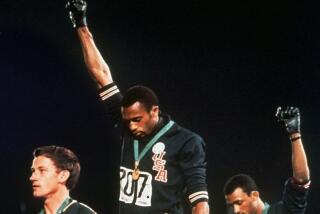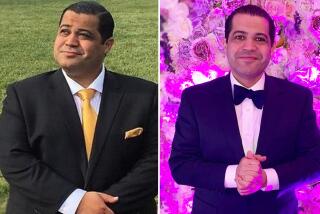Passing the Bar : Former Olympic Champion Vardanian Lends Expertise to U.S. Weightlifters
- Share via
MOORPARK — It takes a gentle push, a little prodding, before Yury Vardanian agrees to the request.
He rises from one of the workout benches in the cramped weightlifting room at Moorpark College, his red shirt and warmup pants a visual reminder of his days as a sports icon in the former Soviet Union, and strides to the barbell loaded with weight-plates.
Two-hundred-forty pounds worth of weight-plates.
“Now?” he asks in English, a language he still has not mastered, as a photographer gets ready to snap his picture.
Then, without doing as much as a pushup to stretch his muscles, Vardanian reaches down and with amazing speed hoists the barbell to the shoulder girdle above his chest. After a pause, he jerks the barbell over his head, his outstretched arms and legs perfectly still as the camera clicks away.
Vardanian, 39, smiles. These might not be the Olympic Games or World Championships he once ruled, and he is now a coach who hasn’t lifted competitively in a decade, but showboating still gives him a rush.
A few feet away, Lance Vermeil, a Moorpark student and weightlifting champion trained by Vardanian, flashes an “I-told-you-so” look. He says Vardanian, who has lived in Glendale with his wife and three sons since 1991, is fiercely competitive.
“I bet him one time that he couldn’t do five snatch pulls with 242 pounds and no warmups and the sixth had to be a full snatch [lift], and I lost a dinner on it,” Vermeil said.
This time, the prize was only personal satisfaction.
*
Several years ago, no one doubted the ability of the man some call, pound-for-pound, the greatest weightlifter ever.
Even in his early days in the sport, before he became an international superstar, Vardanian was no pushover.
Born in Leninakan (now Gumri), Armenia, Vardanian became interested in weightlifting at age 8 by watching his uncle Sergei compete. He took up the sport five years later and won the 165-pound class at the junior world championships in 1975 and 1976, setting three world records in each competition.
“I always thought I would become a world champion, although I don’t know why I felt that way,” Vardanian said through an interpreter.
“As a kid, I was scared of airplanes. When my father used to take me to visit my aunt, it was only a one-hour flight, but I used to get scared and nauseous. But then I started thinking that I would have to fly a lot when I became world champion, so I got over the fear.”
By the Moscow Olympics in 1980, Vardanian was on a different plateau than other lifters in the 181.5-pound weight class. The Games should have given Vardanian great international exposure, but the United States-led boycott took care of that.
Fueled somewhat by nationalistic pride and encouraged by his uncle, then an assistant coach for the Soviet team, Vardanian cranked it up a notch.
He swept the light-heavyweight division with 177.5 kilos (391 1/2 pounds) in the snatch, 222.5 (490 1/2) in the jerk and 400 (882) total, all world records. His total would have earned Vardanian a gold medal in either of the next two higher weight classes.
There were allegations in those Games that Soviet lifters had been using steroids to enhance their performance. Vardanian says he was clean but the rumors were not altogether unfounded.
“It’s a fact that many weightlifters took banned substances,” Vardanian said. “From what I know, the Soviet team took less than anybody else. But in competition they were always clean. The Soviet weightlifting federation never encouraged it. The athletes got the steroids in the black market. . . . The International Weightlifting Federation then started doing random testing even at training camps.
“Anybody should be able to tell by looking at me that I never took [steroids]. My weight didn’t drop a lot [after the Olympics] and I was able to have kids. You should be able to tell by the aftermath. That speaks for itself.”
*
After the Olympics, Vardanian was practically worshiped in the Soviet Union.
“He was a god,” said Yury Boroda, a Ukrainian-born former weightlifter who grew up in the Los Angeles area and was the 1989 U.S. junior national champion in the middleweight division. “I used to read about him. After I met him, I found out he’s as good a person as he is a sportsman.”
Vardanian didn’t have the opportunity to defend his Olympic title in Los Angeles in 1984 because the Soviets and other Eastern-bloc nations bypassed the games in retribution for the U.S.-led boycott four years earlier. But Vardanian nevertheless served notice that he was still the force among light-heavyweights.
In September, 1984, at the Friendship Games in Bulgaria, Vardanian set a world record with combined lifts of 405 kilos (893 pounds), 50 kilos more than Romanian Petre Becheru’s gold medal effort at the Olympics a month earlier. With that display, his social and political status improved even more at home as he reaped the benefits of trumpeting, with his athletic prowess, the virtues of communism.
“They [government] used to give me cash, free clothes, a car, an apartment,” Vardanian said. “Back then, the way they raised you and explained things to you, it was totally different.
“Whenever I traveled [abroad], I would never think of defecting, even if someone had given me millions of dollars.”
Vardanian retired with 43 world records and seven world titles after winning the World Championships in Sweden in 1985. He returned to Leninakan, earned a degree in economics and became involved in local government.
Until America called.
*
Throughout his life, Vardanian had been a devoted Soviet. It wasn’t the perfect system but he had done well by it. He was a revered sports hero in a society that cherished its champions because there was little else to treasure.
But by the late 1980s, the nation was undergoing monumental political and economic reforms through premier Mikhail Gorbachev’s glasnost and perestroika programs, and everything changed dramatically. It affected even sports legends in good standing, who were well-connected and eternally privileged under the old system but whose past accomplishments no longer guaranteed favorable treatment.
And when human forces weren’t pulverizing the essence of Soviet life for generations, nature did its part creating more havoc. On Dec. 7, 1988, a 6.9 earthquake killed 100,000 in Armenia, left thousands homeless and leveled Leninakan. Vardanian and his family escaped injury, but their home was heavily damaged.
“I had gone to Indonesia as a member of an international technical committee and had just returned home eight hours before the earthquake,” Vardanian said.
Three years later, Vardanian left Armenia and hasn’t returned. He came to work as a consultant for the U.S. Weightlifting Federation and settled in Glendale with his wife, Eleonora, and sons David and Norair. A third son, Michael, was born here. Vardanian still works for the federation and also as Vermeil’s personal trainer.
That arrangement began about a year ago. Al Vermeil, Lance’s father and the brother of former UCLA and NFL coach Dick Vermeil, learned that Vardanian was in the United States and asked him to coach his son.
Al Vermeil, the Chicago Bulls’ strength and conditioning coach, knew all about Vardanian.
“When I found out he was here, I brought him to the Bulls [in 1994] to work with me for a while and he and Lance hit it off,” Vermeil said. “The relationship grew and I found a place for Lance to go to school in California so he could train with him. . . . I’ve always believed that the Eastern Europeans, when it comes to physical development and training, were way ahead of everyone else.
“Yury has always been a hero of ours because I thought he was not only a great lifter, but a tremendous athlete. I have a video that shows him after he set a world record in a meet. He jumped from the floor to the stage in one motion. There must have been seven or eight steps.”
*
There are, however, many more steps to Vardanian’s training methods. And Lance Vermeil is learning them all.
Vermeil, 20, is a promising lifter who hopes to make the U.S. team for the 2000 Olympics. Last week he won the 140.8-pound class at the national college open weightlifting championships in Shreveport, La. He trains with Vardanian six days a week at Moorpark because he attends classes there and the school has an area designated for weightlifting.
The two meet in the afternoon, the teacher with paper and pencil to jot down notes, the student with little more than a pair of trunks and a desire to learn from a master. Despite Vardanian’s shortcomings with English, they somehow communicate.
“Again, Lance,” Vardanian says, and Vermeil does another set of snatch pulls.
“The biggest thing I’m learning from him is the mental strength that I would need to go to the Olympics,” Vermeil said. “I’m learning how to walk in [at a competition] and know that I’m going to make it, to walk in with confidence.”
Vardanian and Vermeil sometimes counterbalance the monotony of training by playing tennis with a volleyball and no rackets. That’s when Vardanian shows some of his athletic ability, Vermeil said.
“I’m not joking, he’s the Michael Jordan of weightlifting,” Vermeil said. “He runs me all over the court and he hates to lose.”
That kind of speed is part of what Vardanian believes a weightlifter must possess to become successful. That and absolute dedication.
“The athletes here don’t work hard enough. Instead of six hours a day, they work two hours a day. Because of that, everything falls behind--the technique, the power,” Vardanian said. “To make a world champion, you need to have good arm lockout and good flexibility. You need good speed. A guy who runs fast has fast muscles. And he has to love the sport and work hard. Then you can expect a world championship for him.”
Not long ago, they probably talked the same way about a man named Vardanian.
More to Read
Go beyond the scoreboard
Get the latest on L.A.'s teams in the daily Sports Report newsletter.
You may occasionally receive promotional content from the Los Angeles Times.







